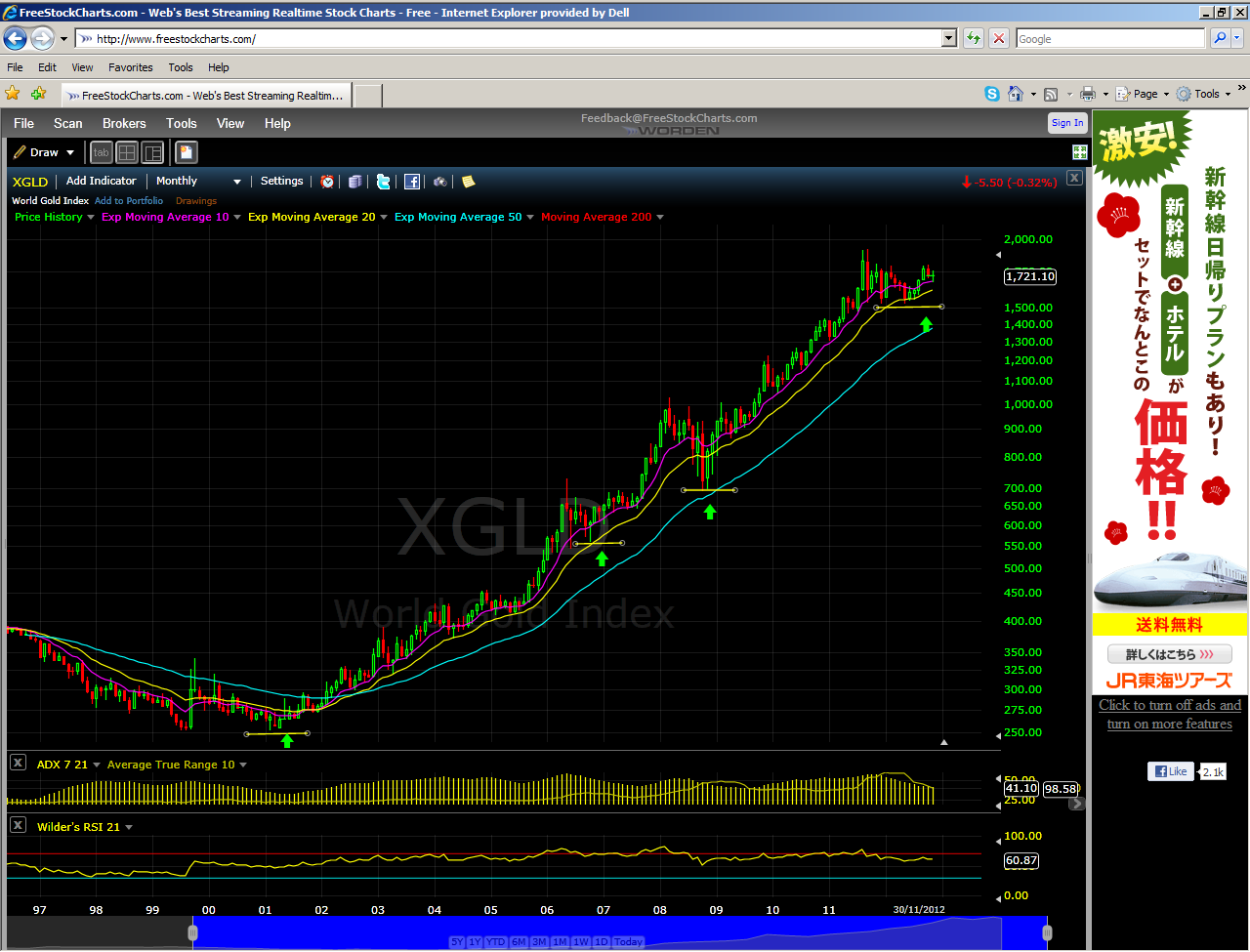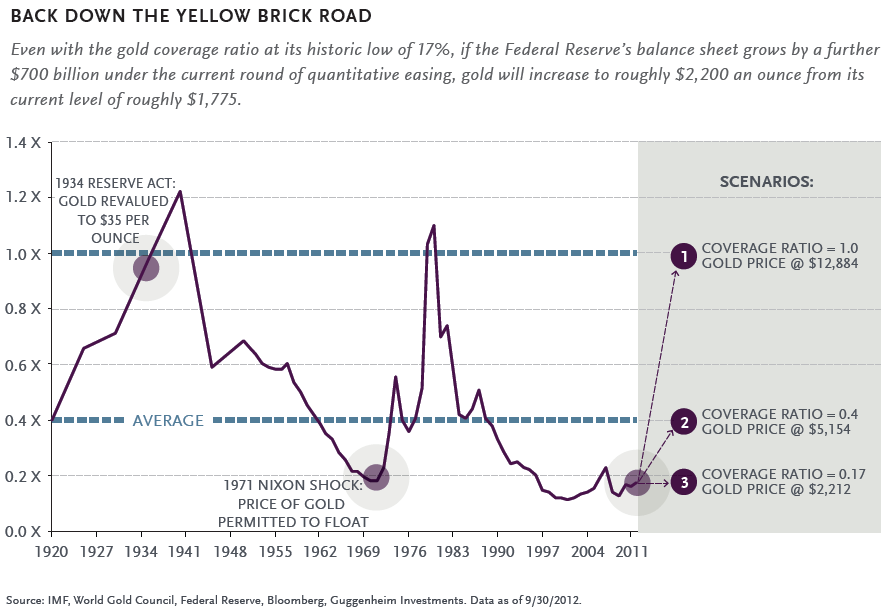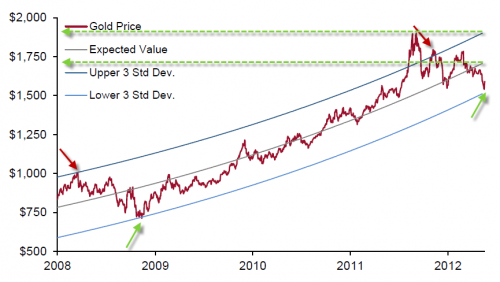Even if Gold Is Stupid, It’s Still Smart
There have been decades of debate in finance over gold – long before the recent, rapid rise in gold prices. Some see gold as a way to diversify into an asset with less direct correlation to the overall market. Others view gold as no more than a lump of yellow metal. It produces no cash flows. How can it be possibly worth anything?
In a way, the naysayers are right. Gold does not produce any cash flows, so that naturally makes it suspect. If someone were trying to sell me a stock that produces no cash flows and never will, I’d tell him where to stick that stock –and let me tell you it wouldn’t be inside my brokerage account.
However, any company faces this same problem with its products. Take Apple, for example. Does Apple produce cash flows and dividends? Of course it does. At the same time, its products don’t do anything… they’re not much different than a lump of gold. No, I’m not crazy. Your Apple iPad does not produce cash flows. Not a single cent – just like an ounce of gold. Of course, Apple sells iPads to make cash flows and dividends, but really the same is true with gold. Newmont Mining and Barrick Gold also earn cash flows and pay dividends as well by selling their product: gold.
However, there’s a reasonable objection to this point. A gold-hater might say, “Wait, I’m still right. Gold is stupid. It’s just a block of metal. An iPad is actually useful and fun.” True, but who is to judge the preferences of others? Gold might be stupid in some people’s eyes, but maybe purchasing an $800 iPad is stupid in others’. Personally, I think that they’re way too expensive. I like the iPad, but at its current price, I could go the rest of my life without owning one.
The world is full of products which someone else finds dumb. Here’s another example: Louis Vuitton purses retailing for $3,000. In my personal opinion, if you’re spending that kind of money on a purse, you’re an idiot. Does that mean that I would never invest in Louis Vuitton? Even though I personally think these purses are dumb, my opinion doesn’t change the fact that others continue to buy them. Hence, at the right price, I wouldn’t mind owning shares of the company. The marketplace is not about just betting on products that you think are great, but investing in products that others find worthwhile.
This is what the anti-gold crowd doesn’t get. Even if you think that gold is pointless, a whole lot of other people in the world think otherwise – and they are going to keep buying gold as they have been doing for thousands of years. When times get tough and inflation rises, people will buy even more gold. Maybe they’ve all lost their minds, but that won’t change the end result of skyrocketing gold prices. Many societies values precious metals, and they will continue to do so.
However, the same can’t be said of many other products. If I buy a $3,000 purse for my wife and a new iPad, what will those be worth in 10 years? The purse will probably end up in a thrift shop, and I won’t be able to give the iPad away to a homeless man within a decade. With gold, it’s different. If you buy an ounce today, it’s going to worth something a decade from now. Maybe it’ll be worth $5,000 an ounce… or maybe $200, as the naysayers believe. But it certainly won’t be worthless.
Even stocks won’t necessarily keep their value. Sure, Apple’s cash flows and dividends seem stable now, but where are they going to be in a decade? That’s a long, long time in the world of tech. Are you sure that they’ll just keep making amazing product after product? I wouldn’t bet on it. Maybe the stock won’t be completely worthless in ten years, but what about a more distant time frame?
Would you bet against me in the following proposition? I bet that in 500 years, gold will still hold some value, while Apple’s stock will not. Few companies have retained any value over 500 years. In any time in history with almost any company, I would come out ahead in that bet. The odds are overwhelmingly in my favor.
But there’s a problem with my bet – besides the fact that both bettors will dead in 500 years. What are we going to bet: $1,000, $50,000, or maybe even a billion dollars? Do those stakes sound too high to you? They don’t sound very high to me… have I gone even crazier? No; the crazy person is the one who would accept the bet in US dollars.
Even if you’re really optimistic about the country’s immediate future, the long-run track record of fiat paper currencies is pretty bad. Those dollar bills might be worth something in 500 years – in a museum, but not on the street. Even at a low inflation rate of 2% over 500 years, a million dollars will have the purchasing power of a little over $50 today.
Look, maybe you still think that gold is stupid – and that’s fine. But the fact of the matter is that much of the rest of the world doesn’t. In fact, the world has valued gold for the last few thousands of years. This perception has survived wars, recessions, plagues, and natural disasters. Just like some people will keep spending money on expensive purses they don’t need, others will keep buying gold that just sits in a vault and does nothing. Maybe the gold naysayers are right that buying gold is silly, but that’s not going to stop people from doing it.
So, here’s the conundrum for the anti-gold crowd. If everyone keeps buying gold regardless of what happens, is it really so stupid to own it? Hey, I think that paper money is the dumbest thing on earth, but that doesn’t stop me from using it. Getting the market right is all about figuring out what other people want, rather than being swayed by your personal biases. As a result, even if you personally think gold is stupid, it still is a smart investment.
by Vedran Vuk
What Does A $4 Trillion Fed Balance Sheet Mean For Gold And Oil
Earlier we explained why Bernanke’s actions today mean that the Fed Balance Sheet will likely grow to over $4 trillion by the end of 2013. Critically this flood of liquidity will raise the nominal price of every asset (from whimsical pieces of stockholder paper to barbarous relics and black gold). Some of these assets, like stock prices and high-yield credit spreads do have point-in-time ‘value limits’ to their price – though at times it seems a dream that fundamentals would ever matter again; but some have less of a binding constraint – such as gold. Should the Fed proceed, as seems likely, and do its worst/best to blow its balance sheet wad then we estimate Gold will be priced at least $2250 per ounce by the end of 2013 (of course higher if the Fed sees no evidence of recovery). Meanwhile, deeper underground, the world’s mainstay source of energy, WTI Crude oil, could jump to record highs over $150 per barrel (which just happens to coincide with the ‘pegged’ value of oil in gold). It will be interesting indeed to see how the world’s socio-economic infrastructure hangs together should that occur – can’t happen? Different this time? Indeed it is now that Ben hit the big red ‘panic’ button.
Gold vs Fed and ECB balance sheets… notably for QE2, gold priced in all the Fed balance sheet expansion within around half the period (around six months from Jackson Hole) and then overshot – this would infer we see Gold $2250 around the end of the first quarter next year – and expect some overshoot…
Oil vs Fed balance sheet… (which fits nicely into the 0.07 oz of Gold per barrel ‘peg’ that seems to have been ‘agreed’ with the world’s oil producers).
from zerohedge.com
Something we at Banner have been saying for years now . . . oh and buy gold and silver
Something we at Banner have been saying for years now . . .
Gold
The data from Bloomberg,: “Gold imports by mainland China from Hong Kong climbed 65 percent to a record in April, advancing for a third straight month as investors sought a hedge against financial-market turmoil and an economic slowdown.
And more from Sprott and his latest letter:
There have been key developments in the physical gold market over the last few weeks which we feel are worth highlighting:
1) The Chinese gold imports from Hong Kong in April, 2012 surged almost 1300% on a YoY basis. Total gross imports for the month of April were 103.6 tonnes and the net imports were 66.3 tonnes. It is not the data for April alone which has caught our eye. There has been a stunning increase of gold imports through Hong Kong for export into China over the past 2 years. Between May 2010 and April 2011, China imported a net 66 tonnes of physical gold through Hong Kong. Between May 2011 and April 2012, that number jumped to 489 tonnes. This represents an increase of 640%.
2) Central banks from around the world bought over 70 tonnes of gold in April, 2012. Data from the IMF showed developing countries such as the Philippines, Turkey, Mexico and Sri Lanka were significant buyers of gold as prices dipped.
3) Iran purchased $1.2B worth of gold in April, 2012 through Turkey. As the developed nations continue devaluing their currency at the expense of developing nations, countries such as Iran, China and Mexico are forced to look at alternative stores of value.
4) After twenty years of lackluster returns and stagnant bond yields, Japanese pension funds have finally discovered the value of investing in gold. The $500M Okayama Metal and Machinery pension fund placed 1.5% of its assets into gold bullion-backed ETFs in April in order to “escape sovereign risk”.
5) Bill Gross writes, “Soaring debt/GDP ratios in previously sacrosanct AAA countries have made low cost funding increasingly a function of central banks as opposed to private market investors. Both the lower quality and lower yields of previously sacrosanct debt therefore represent a potential breaking point in our now 40-year-old global monetary system. […] As they (investors) question the value of much of the $200 trillion which comprises our current system, they move marginally elsewhere – to real assets such as land, gold and tangible things, or to cash and a figurative mattress where at least their money is readily accessible”. Is the bond king recommending gold? YES, YES YES!
6) The Gold Mining ETF, GDX, has seen strong inflows in the past 3 months. The number of units outstanding have increased from 162.5M to roughly 187M between March 1, 2012 and May 31, 2012. This represents an increase in assets of almost $1.2B in a span of 3 months. It is worth pointing out that for a majority of this three months period, GDX, and by extension the gold mining companies were experiencing significant declines in their market values.
We believe there has been a material change in the gold investing landscape. The HUI, which is the Gold Bugs Index, is now up over 20% from its lows since May 16th, 2012. The slide in gold equities seems to be subsiding as a foundation for a strong move upwards is set. New buyers, represented by the Chinese, central banks, Japanese pension funds and the Iranians, bought almost 140 tonnes of gold in April alone. To put this into perspective, the annual gold production is approximately 2600 tonnes. China and Russia produce around 500 tonnes of gold annually, which never makes it to the open market. This leaves about 2100 tonnes of gold production annually for the rest of the world.
When buyers representing 140 tonnes of new demand enter a market which only has 175 tonnes of monthly supply, we are left wondering about two things:
1) In a balanced market, where is the source of supply to the new buyers going to come from?
2) How can a new buyer of size get into the gold market, which is already balanced, without significantly impacting the price of gold?
The answer is fairly obvious. When demand outstrips supply, prices move higher. These significant macro changes in the supplydemand dynamic of the gold market should propel the price of gold to new highs.
GOLD: in the first four months of 2012 Chinese purchases have increased by an unprecedented 782% over 2011.
A month ago we were delighted to counterpoint Charlie Munger’s prior remarks about the level of “civilization” of a given consumer based on their sentiment vis-a-vis gold, by demonstrating that Chinese purchases of gold from Hong Kong rose to a record. To wit: “Imports from Hong Kong were 135,529 kilograms (135.53 metric tons) between January and March, from 19,729 kilograms in the year-earlier period, according to data from the Census and Statistics Department of the Hong Kong government. Shipments in March rose 59 percent from February, yesterday’s data showed.” We have just gotten the April update, and, lo and behold, the country which is now the biggest buyer of gold, having surpassed India, just set a new record: “Gold imports by mainland China from Hong Kong climbed 65 percent to a record in April, advancing for a third straight month as investors sought a hedge against financial-market turmoil and an economic slowdown. Shipments totaled 103,644.5 kilograms (103.6 metric tons) in the month from 62,913 kilograms in March, according to export data from the Census and Statistics Department of the Hong Kong government today. In the first four months, imports were 239,174 kilograms from 27,114 kilograms a year earlier, according to Bloomberg calculations. China doesn’t publish such figures.” In other words: in the first four months of 2012 Chinese purchases have increased by an unprecedented 782% over 2011.
And this is only from Hong Kong! Said otherwise: “Is the PBOC, which officially has just 1,054 tons of the yellow metal, quietly and relentlessly stockpiling gold?” Oh yes.
Expect a formal announcement from the Chinese central bank in the months ahead, indicating the country’s gold hoard has increased by at least 100%. What happens then to the price of gold is rather self-explanatory.
Will Basel make make gold a Tier 1 asset?
Banking capital adequacy ratios, once the domain of banking specialists
are set to become centre stage for the gold market as well as the wider
economy. In response to the global banking crisis the rules are to be
tightened in terms of the assets that banks must hold and this is
potentially going to very much favour gold. The Basel Committee for Bank
Supervision (or BCBS) as part of the BIS are arguably the highest
authority in banking supervision and it is their role to define capital
requirements through the forthcoming Basel III rules.
In short, they are meeting to consider making gold a Tier 1 asset for
commercial banks with 100% weighting rather than a Tier 3 asset with just
a 50% risk weighting as it does today. At the same time they are set to
increase the amount of capital banks must set aside as well. A double win
potentially.
Hitherto banks have been much dis-incentivised to hold gold while being
encouraged to hold arguably riskier assets such as equity capital,
currencies and debt instruments, none of which have fared too well in the
crisis. With this potential change in capital adequacy requirements. bank
purchases of gold would drive up its value relative to other high quality
qualifying assets, increasing its desirability for regulatory purposes
further. This should result in gold being re-priced to bring it on a par
with all other high quality assets.
Currently banks have to have core Tier 1 capital ratio of 4% of which will
rise to 6% from the beginning of next year. In addition to its store of
value merits, central to the argument in favour of gold as a bank reserve
is its countercyclical nature to most other assets in that it tends to be
inversely correlated. Gold is ideal as it bears no credit risk. it
involves no other counterparty and it is no one’s liability. It is a
reserve asset diversifier if you like.
This is a treble win for gold – it would be a major endorsement of its
role in preserving wealth and as a store of value from the highest
financial authority, it would lead to significant purchases of gold by
major financial institutions and it would lead to a reappraisal of its
value with respect to other Tier 1 capital such as quality sovereign debt.
Under the new rules gold could become a very significantly larger
proportion of a reserve pool which is about to grow very much larger.
The 2 questions that come to my mind are when and how much metal – on
timing Basel III kicks in from January 2013 with a further tightening in
capital adequacy ratios in 2018. That said, it is not yet clear when
gold’s re-rating to Tier 1 might take place.
Does The Gold “Support Channel” Mean The Drop Is Over?
With the inevitable talk of further easing from the ECB and the ‘Fed must act soon surely’, this chart via UBS shows the longer-term support channel suggesting, at least for those who follow technical analysis, that gold’s dip may be over…






